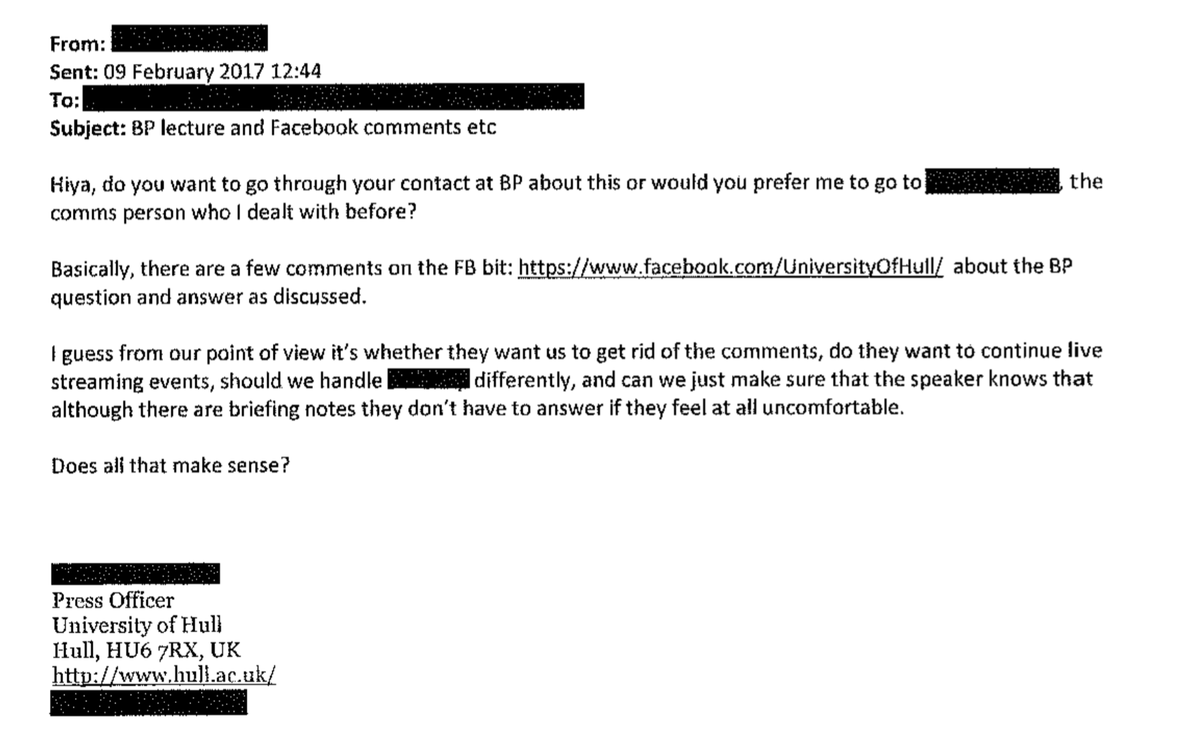New documents detail how oil major BP worked with staff from the University of Hull and the Hull City of Culture, which coordinates cultural events in Hull, to limit the amount of criticism BP would receive in response to its sponsored lectures at the university.
The oil major has received criticism over the years for its attempts to greenwash its image through sponsoring art exhibits and other cultural events. The emails released under the Freedom of Information Act to campaign group Culture Unstained, and seen by DeSmog UK, now show attempts by BP, the University and the City of Culture to coordinate how they would handle activists or “awkward questions”.
Over the past year, BP has sponsored a “Cultural Visions” lecture series which hosted artists and cultural figures at the University of Hull. This news comes as the final lecture in the series is held on Wednesday December 13 with speaker Ian Blatchford, director of the Science Museum Group.
The emails, Culture Unstained argues, show that “as pressure has mounted on BP’s sponsorship, the company has been trying to clamp down on criticism and, worryingly, the University has been willing to help.”
Last January, Culture Unstained’s Chris Garrard published an op-ed on Huffington Post blogs ahead of the first lecture held on January 19. The article was shared between BP and the City of Culture team, which is partnered with the University of Hull. The company suggested it might be useful for the “BP security folk to check in with yours and the university’s” as well as suggesting the University of Hull implement a bag check at the next event, the emails show.
Then, in February, BP’s head of arts and culture, Des Violaris, pushed for a brief for speakers regarding potential “awkward questions” they might receive regarding the oil company’s controversial sponsorship of the lecture series.
In response, someone whose name and affiliation was redacted but is likely from the City of Culture, replied on February 7: “I’ve included everyone’s changes, and separated out an ‘activist activity’ section. I haven’t included a Q&A as such, as our press team have advised that BP work on a reactive basis to intelligence on activists.”
BP’s second lecture took place on February 8. The following day an email was sent by the University’s press team with the subject “BP lecture and Facebook comments etc”. In it, the University offers to remove comments about BP.
The email reads: “Hiya, do you want to go through your contact at BP about this or would you prefer me to go to [redacted] the comms person who I dealt with before? Basically, there are a few comments on the FB bit: http://facebook.com/UniversityOfHull/ about the BP question and answer as discussed.
“I guess from our point of view it’s whether they want us to get rid of the comments, do they want to continue live streaming events, should we handle [redacted] differently, and can we just make sure that the speaker knows that although there are briefing notes they don’t have to answer if they feel at all uncomfortable. Does all that make sense?”
No answer from BP or the Hull City of Culture team is included in the series of documents released and it’s unclear whether any comments were removed. According to the University, none were. Critical comments still appear on the University’s Facebook page post regarding the February 8 lecture which hosted a discussion on a play entitled “The Hypocrite”.
One comment from BP or not BP campaigner Danny Chivers reads: “Hull is one of the UK cities most at risk from climate change, and yet BP is sticking its logo all over cultural events like this one. The title ‘Hypocrite’ takes on a whole new meaning…”
Once again, in May, the University staff offer to cut out activist voices from film clips of one of BP’s lectures. An email dated May 24 to BP reads: “Who else would you like us to get thoughts/sound bites from? [redacted]–audience members as long as its not the activist”.
A spokesperson from the University told DeSmog UK: “As part of the University’s commitment to actively encouraging diversity of thought, we ensure that all members of the audience have the opportunity to ask questions and as such, this is built into the format of our lectures. In line with this commitment, the University did not remove comments on social media.”
In a statement, Chris Garrard from Culture Unstained noted: “Ironically, this final lecture will be given by the Director of the Science Museum, someone who should be standing up for science rather than backing a company that has relentlessly lobbied against climate action.”
He told DeSmog UK that BP‘s environmental record and previous involvement with efforts to spread disinformation about climate change should have disqualified it from being considered as a sponsor for the event.
“For a respected, independent university – and members of the City of Culture team – to offer to bend to BP‘s agenda while being aware of this record is deeply concerning.
“As the climate crisis intensifies, our educational institutions have an important role to play, both in terms of researching clean energy alternatives but also by defending the freedom to scrutinise a fossil fuel industry which, for years, knowingly spread misinformation about climate change.
“There is an unpleasant irony that Hull is one of the UK‘s cities most at risk from sea level rise in the coming decades and it it is there, during City of Culture, that BP has attempted to make the festival into a billboard to burnish its brand.”
Anna Markova from campaign group Platform London told DeSmog UK the exchanges demonstrated the lengths BP will go to in order to project a positive public image. She said:
“These revelations show BP sponsorship is not some kind of charitable philanthropic project, but a cynical, tightly controlled transaction aimed at improving the company’s image. All this at a time when it’s abundantly clear that fossil fuels have no future. Increasing numbers of cultural organisations and figures are committing to refuse oil sponsorship deals – the University of Hull should join them.”
Danni Paffard, a UK divestment campaigner with 350.org told DeSmog UK that the episode demonstrated why “universities, museums and cities need to put an end to this corporate take-over. No fossil fuel sponsorships. No public money for fossil fuels.”
“These revelations show once again that oil and gas companies like BP are not just destroying our climate, trample on human rights and destroy entire ecosystems. They also undermine our democracy at home.
“How can a university be giving a company a platform whose reckless greed for more and more oil and gas is pushing us all into climate chaos? And how can they be complicit in trying to silence critics?”
BP did not respond to a request for comment for this story.
Note: This story was updated on 14 December 2017 at 2:03pm GMT to include comment received from the University of Hull.
Photo: Opening of Hull City of Culture 2017, Wikimedia Commons | CC4.0
Subscribe to our newsletter
Stay up to date with DeSmog news and alerts








